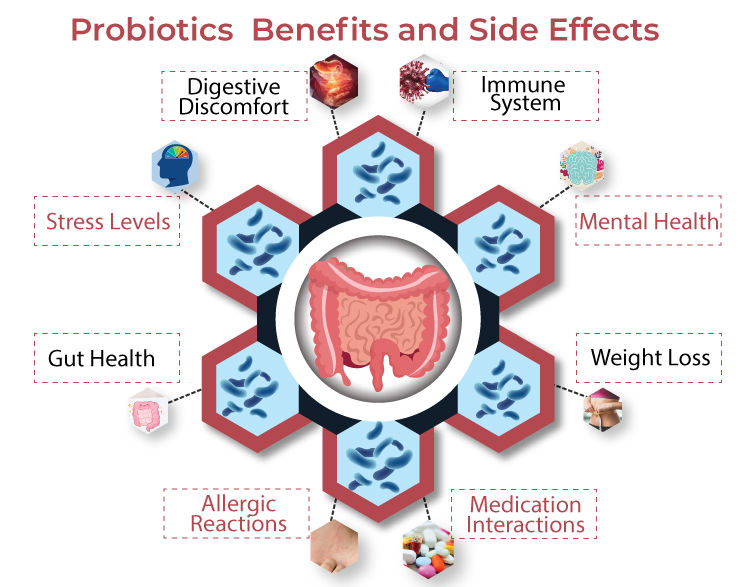What Are Probiotics?
Probiotics are bacteria in your gut, skin, and other body parts. They are often called "good bacteria" because they help keep your body healthy. Probiotics can be found in yogurt, supplements, and other foods. A healthy gut microbiome can positively impact your overall health and well-being. That is why many people are turning to probiotics for their health needs.
Types of Probiotics
There are many different types of probiotics. But let's focus on the two most common types: lactobacilli and bifidobacteria.
Lactobacilli is the most common probiotic. It is present in yogurt, kefir, and pickles. Lactobacilli help breaks down lactose (milk sugar) and is often recommended for people who are lactose intolerant.
Bifidobacteria is found in breast milk and helps digest complex carbohydrates. Bifidobacteria is also known for its anti-inflammatory properties. It can be helpful for people with acne, eczema, and other skin conditions.
Health Benefits of Probiotics
There are plenty of reasons to love probiotics. Not only are they great for digestive health, but they also offer a range of other benefits. Here are some of the key advantages of taking a probiotic:
Side Effects of Probiotics
Are there any side effects to using probiotics? Most people don't experience any severe side effects from probiotics. However, there is still a slight possibility.
The most common side effects include gastrointestinal symptoms. This can include bloating, abdominal cramping, flatulence, and diarrhea.
There could also be headaches and skin reactions such as rashes or itching. In rare cases, there can be allergic reactions as well.
It's important to remember that everyone is different. You may be sensitive to particular probiotics. If you're experiencing any of these symptoms, it's best to reduce the dosage or take different kinds of probiotics until you find one that suits you best.
And if the symptoms persist regardless of dosage or strain, it's best to discontinue use altogether and seek medical advice from a physician.
Benefits of Probiotics for Women
The use of probiotics has been linked to a variety of health benefits, especially for women. Taking probiotics daily may help women:
Reduce the risk of vaginal yeast infections,
Support a healthy menstrual cycle,
And reduce the severity of PMS symptoms.
It can also help reduce inflammation, improve digestion, and boost immunity.
This is because probiotic supplements introduce "good" bacteria into the body. It can help balance out the gut microbiome, which is linked to many aspects of health. Regarding women's health, probiotics benefit vaginal health by maintaining pH balance. Along with it, they also combat harmful bacteria.
They may even help with weight management since some beneficial bacteria have been linked to improved metabolism. Others can help reduce inflammation and promote nutrient absorption in the intestines. So if you're looking for a way to support your overall health as a woman, taking advantage of the benefits of probiotics is what you need.
A Brief Recap
Probiotics are bacteria and yeast that live in your gut and help keep it healthy. And when your gut is healthy, it can impact the rest of your body in amazing ways. That's why people are turning to probiotics for their health needs.

So, what can probiotics do for you? Here's a rundown of some of the top probiotics benefits:
Gut Health: Probiotics can help regulate your gut microbiome, which can improve digestive health and alleviate symptoms of digestive issues such as bloating, constipation, and diarrhea.
Immune System: Probiotics can boost your immunity by improving the function of your gut-associated lymphoid tissue, which is a big player in your body's immune response.
Stress Levels: Probiotics have been known to reduce cortisol, the hormone associated with stress. Who wouldn't want a little extra help with that?
Mental Health: Probiotics have been linked to improved mental health, including reduced symptoms of anxiety and depression. Your gut and brain are more connected than you think!
Weight Loss: Probiotics have improved metabolism and support weight loss efforts. Score!
But wait, there's more! Let's talk about the potential side effects of probiotics:
Digestive Discomfort: Probiotics can cause digestive discomforts, such as bloating, gas, and abdominal pain. This is more common with probiotic supplements, so it's always good to start slow and work your way up.
Medication Interactions: Probiotics can interact with certain medications, so it's important to talk to your doctor before starting a probiotic supplement.
Allergic Reactions: Some people may be allergic to probiotics, so it's important to be aware of any potential symptoms and talk to your doctor if you experience anything unusual.
So, What's the Final Verdict on Probiotics?
Are probiotics good for you? They have numerous potential health benefits, but it's always best to talk to your doctor before starting a supplement. But don't worry; plenty of probiotic-rich foods can be incorporated into your diet, such as yogurt, kefir, and sauerkraut, to boost your gut health without the risk of side effects.
In Conclusion
probiotics are like the Robin to your gut's Batman. They may be small, but they pack a big punch for your health. So, unlock the power of probiotics and let them help take your health to the next level!
FAQs on Probiotics
You may be wondering what other questions you might have about probiotics. Here are some of the most popular ones that I often get asked.
Can I take probiotics for weight loss?
While some research suggests that certain strains of probiotics may have a small impact on weight loss, the evidence is not strong enough to recommend probiotics as a weight-loss aid. If you're interested in trying probiotics for their health benefits, you should speak with a healthcare provider to determine what strain and dose may be best for you.
Are there any potential side effects?
Generally speaking, probiotics are safe to take when taken as directed. However, if you experience an adverse reaction or develop an infection after taking a supplement, please consult a medical professional immediately.



 Contact Us
Contact Us






 Hospitals
Hospitals
 Doctors
Doctors
 Diagnostic
Diagnostic
 Pharmacy
Pharmacy
 Health Tips
Health Tips
 Blog
Blog


















Comments